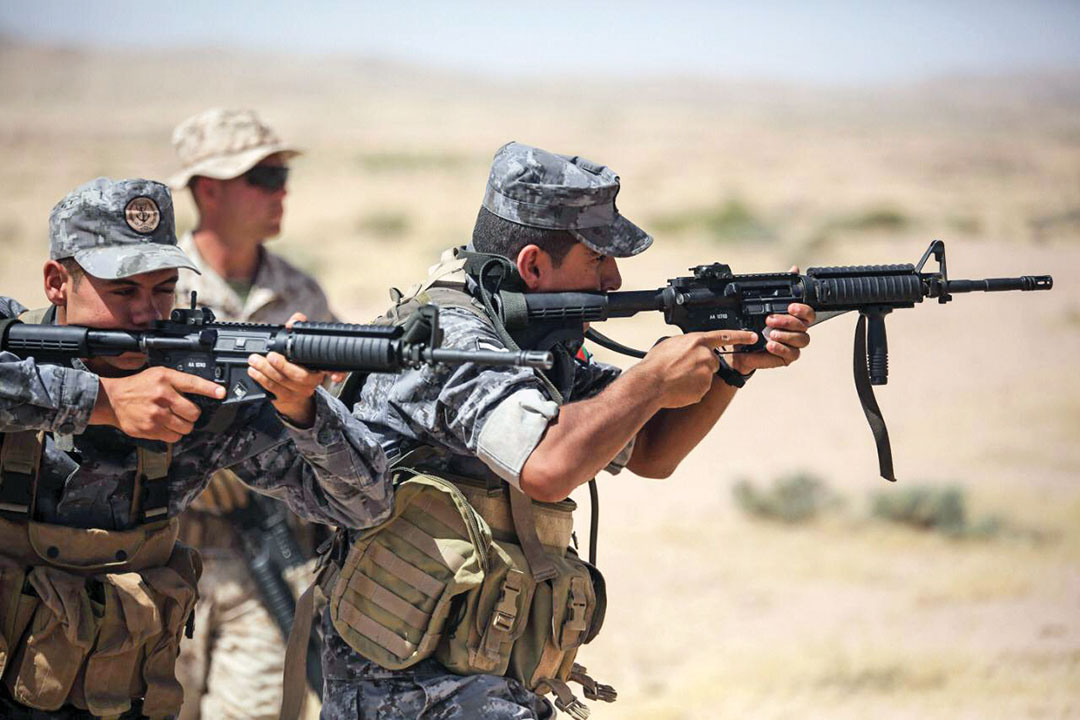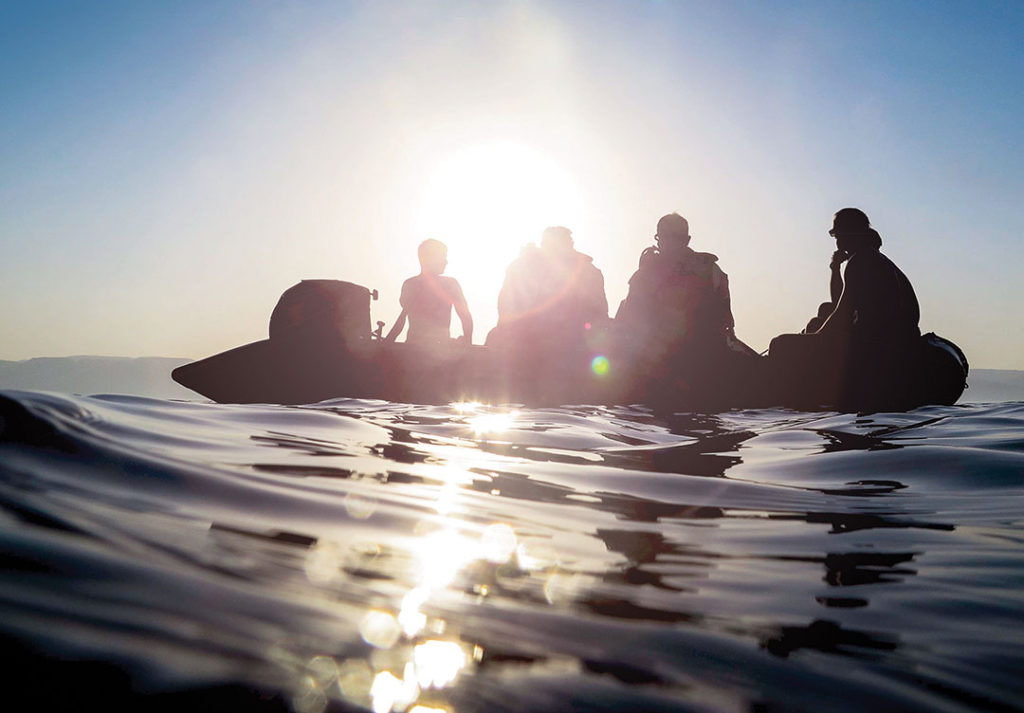Jordan assembles a Marine battalion to protect the vital port of Aqaba and conduct overseas missions
UNIPATH STAFF
At the Regional Marine Symposium in Abu Dhabi in August 2018, Unipath spoke with Staff Lt. Col. Mutasim Al-Rabie, commanding officer of the 77th Royal Jordanian Marine Battalion:
Unipath: What are the duties of the 77th Royal Jordanian Marine Battalion?
Lt. Col. Mutasim: The battalion will protect military bases in Aqaba and provide protection for Jordanian naval headquarters, the Marine Training Center in Titin and other government and economic facilities within the Aqaba region. We are ready to fulfil any duty required by the leadership. The battalion sent three companies to participate in the special operations force in Afghanistan. Each unit was involved for six months. I currently have highly skilled and experienced noncommissioned officers who participated in Afghanistan and worked in a multinational environment. In addition, two teams specializing in ship landing operations were sent to work with coalition countries to fight piracy and smuggling within the Middle East, Gulf of Aqaba and Gulf of Aden.
Unipath: What kind of experience did you gain in Afghanistan working with coalition forces?
Lt. Col. Mutasim: First, as a Marine infantryman operating within a real area of operations, it was very useful to gain experience from friendly forces by participating in the process, becoming familiar with weapons used by other forces and grappling with the enemy in a joint operating environment. We also learned to exchange intelligence among allied countries.
Unipath: What is the battalion’s involvement in humanitarian relief missions?
Lt. Col. Mutasim: The 77th Royal Jordanian Marine Battalion participated in several humanitarian relief missions within the Afghanistan region. Our experience was good in dealing with our brothers in Afghanistan in the field of humanitarian relief. In addition, His Majesty King Abdullah II bin Al Hussein urges peace and stability within the region. We in Jordan are surrounded by conflict zones, and the Arab Army has great experience in dealing with Syrian refugees. They were treated with humanitarian aims in mind and were provided with care and material and emotional support in refugee camps. In addition, our Syrian brothers have shared everything with the Jordanian people. There are now almost 1.5 million of them, or maybe more, which is a huge number for a country with limited resources like Jordan. We support Syrian refugees, trying to provide them with security and reassurance since they have become our guests after they left their own country as a result of the conflict and fighting there.
Unipath: You frequently train with friendly forces in place such as Camp Titin. What is the benefit?
Lt. Col. Mutasim: The U.S. Marines have distinguished themselves as a military force with great capabilities and long experience fighting wars in vastly different circumstances. Working with them provides us with training and tactical know-how. We are extremely happy to work with them in terms of training, as we are hosting a training team from a friendly force that will provide the battalion with all tactics and training needed for marine infantry. At the same time, the Marines benefit from day-to-day interaction and getting to know more about the prevailing cultures, traditions, and customs, as well as the language of Jordan and the whole region in general. In addition, we try to connect with them in our daily lives because their mission is a long one and should include both military and cultural exchanges.

Unipath: Despite the military nature of the marine battalion, you mentioned missions in Aqaba. What is the nature of this task?
Lt. Col. Mutasim: The battalion is ready to deal with any incident within the Aqaba Special Economic Zone. It is the Hashemite Kingdom of Jordan’s only port and contains numerous significant economic and tourist sites. There are also several economically significant ports like the oil and gas port, the phosphate port, and the main port. These ports are vital for the kingdom’s economy. So there must be a force in Aqaba to protect and maintain them, in addition to protecting investments and tourist sites in the region.
Unipath: What are the challenges facing the battalion?
Lt. Col. Mutasim: The challenges are not specific in Jordan but are the same throughout the region, namely extremist and terrorist groups that preoccupy the security services of the region and work to destabilize countries. Fighting these groups and protecting countries from them has become the world’s overriding concern. Neighboring countries have suffered greatly from these terrorist groups that have brought misery and destruction to previously safe cities. These kharajis have distorted the image of Islam with ideas that have no place in the religion. Moreover, they murdered and took the lives of innocent people, causing material and moral damage to many of these countries.
Unipath: What are your plans to develop and maintain the battalion’s performance?
Lt. Col. Mutasim: The battalion was formed in 2006 as a marine infantry company. In 2009, a decision was made to expand it to a battalion. The first and second companies were established, in addition to a leadership company responsible for the battalion’s administrative affairs and for providing the battalion with services and transportation. We have passed through several developmental stages between 2009 and 2018. At the same time, and in parallel, the battalion has been training with forces from friendly and brotherly countries. This simultaneous development and training is being carried out in parallel. The third company was formed in 2011, but there was a shortage in manpower and equipment. Thanks to a royal order, with collaberation of the General Command of the Jordanian Armed Forces and the Navy, we managed to provide the battalion with the equipment it needed to carry out its tasks and assigned operations in full without the support of any other party.
Regarding the battalion’s development in the near future, I received command of the battalion five months ago. I am focusing on developing and preparing noncommissioned officers because they are the battalion’s backbone. Moreover, I am working on educating and increasing the awareness of battalion members and training them about the region and its geopolitical circumstances. Moreover, at the beginning of the coming year, we will start forming a quick response company, by which point we will have filled 95 percent of the ranks of the battalion. The remaining component is the reconnaissance platoon, which is a central and effective part of the battalion because it requires specific development, qualifications, and updated equipment and technology.
Unipath: Tell us about the speedboats the 77th Battalion will receive?
Lt. Col. Mutasim: As I mentioned, we will form a reconnaissance platoon as a part of the battalion’s development plan. These speedboats are a part of the platoon’s equipment, which are assault boats. We are working hard to provide these boats to the Marines as soon as possible to help us use our trained forces to combat piracy and terrorism and to face any threat approaching from the sea.
Unipath: What is your impression of the Regional Marine Seminar?
Lt. Col. Mutasim: Through our participation in the 2018 Regional Marine Seminar, we have had many successful experiences with Marines present in the region. The participating countries were the United Arab Emirates (UAE), Saudi Arabia, Bahrain, Oman, Lebanon and the United States. It was a constructive event that allowed all attendees, including commissioned and noncommissioned officers, to learn more and exchange experiences with participants from other countries in the region. In addition, we learned that some countries have their own methodology in dealing with regional challenges. We listened to the ideas of certain countries for facing challenges and threats. Moreover, we benefited from the successful techniques used by fellow forces to fight smuggling and piracy within their regional waters. And participants exchanged experiences. I would like to thank the sponsors and supporters of this successful seminar, especially the host country, the United Arab Emirates, and the U.S. Marines for sponsoring this seminar. We look forward to continuing this conference, which has enriched the participants so that we stand together as a joint force to maintain the security and stability of our coasts and territorial waters.
Unipath: What experiences shared at the symposium can help Jordan?
Lt. Col. Mutasim: There are many things that have impressed us, such as the experience of our brothers in the Emirates who formed a special strategic force called Al Fursan with distinctive capabilities and technologies that will play a major role in maintaining the security and stability of the UAE coast. In addition, we benefited from the experience of the Lebanese Marine Commandos, who have broad capabilities and numerous specialties. They include Marine infantry, frogmen and bomb disposal experts. This diversity of specialties provides the team with a unique character. Moreover, we learned from Omanis how they merge the duties of Marine infantry with those of the Navy to work as one, since Navy officers receive both naval and Marine infantry training. As for Bahrain, we learned about their first steps toward forming a Marine infantry unit. We have also benefited from the experiences of Saudi Arabia and the increased capabilities of its Marines through focusing on special training provided to the battalion aimed at blocking the enemy’s military operations. This is because the kingdom has extensive maritime boundaries. Each region has its own challenges. The Saudis also have an extensive experience on Yemeni coasts.

